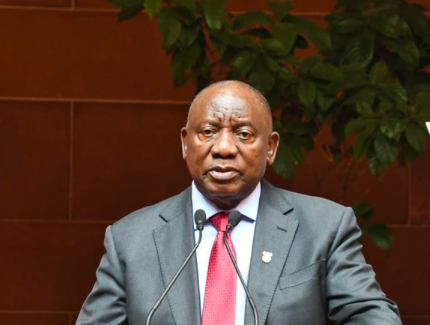Pretoria – President Cyril Ramaphosa on Wednesday signed a new law which aims to provide universal healthcare, two weeks before a general election and despite pushback from the opposition and business groups.
The fund established under the law will provide healthcare for all at rates to be determined by the government, in one of the world’s most unequal nations.
“The National Health Insurance (NHI) is a commitment to eradicate the stark inequalities that have long determined… who receives adequate healthcare and who suffers from neglect,” Ramaphosa said at a televised signing ceremony in Pretoria.
However, it could take years to put the system into practice around the country, experts say.
MPs approved the controversial new law in June last year after years of debate and consultation.
“The provision of healthcare in this country is currently fragmented, it is unsuitable and it is wholly unacceptable,” Ramaphosa said.
President @CyrilRamaphosa signs the National Health Insurance Bill into law#NHIAct 🩺#LeaveNoOneBehind 🇿🇦 pic.twitter.com/YAOaqScnKG
— The Presidency 🇿🇦 (@PresidencyZA) May 15, 2024
The president slammed the opposition which has been critical of the new law and insisted that South Africa was acting in line with a global commitment.
“Those who are trying to hold us back… are completely out of line,” he said.
South Africa inherited 14 health systems from the apartheid era.
A merged system has limped along post-1994 to spark a parallel industry of private but pricey quality care, which the state argues is unfair and unsustainable.
In 2022, only eight million of South Africa’s 62 million people had access to private medical care, with the rest entirely dependent on the government, according to government figures.
The fund would redress the burdened public healthcare system and private sector’s unaffordability, the president said.
Collapse and looting
Opposition parties have condemned the move by the ruling African National Congress (ANC), which risks losing its outright majority in May 29 general elections for the first time since South Africa became a democracy 30 years ago.
They say it risks collapsing the health system and have raised suspicions about the timing of the ratification.
The ANC is “willing to sacrifice the country’s entire healthcare system to remain in power for another term,” said the Freedom Front Plus (FF Plus), a small right-wing and predominantly white Afrikaner party.
The largest opposition party, the Democratic Alliance which has consistently faulted the law, said on X that the NHI will “create a fund… for the ANC to loot”.
“It will put healthcare directly under the direct control of the minister of health,” the party said, adding that “the ANC has already destroyed everything it touches, and will destroy healthcare too.”
Anja Smith, a senior researcher at Stellenbosch University’s economics department, told AFP that it was “very clear that South Africa cannot afford it at this moment”.
Low economic growth, fiscal austerity and budget cuts across public finances including healthcare indicate the lack of funding available, she said.
The continent’s most industrialised economy only grew 0.6 percent in 2023.
Business Unity South Africa (BUSA), a lobby group, said in a statement that the law had “many substantive and procedural constitutional flaws”, describing it as “unimplementable and damaging”.
The group is among many civil society organisations, business and opposition parties who in recent months have considered ways to address the issue including legal action.
‘Improve health outcomes’
Although the move has received pushback from opposition parties, some public medicine experts remained optimistic about the goal.
“The public health sector is underfunded for the needs of the people… and the NHI could provide an injection of additional resources that will improve health outcomes,” said Tracey Naledi, doctor and professor of public health at the University of Cape Town.
Naledi told AFP many unanswered questions remained about the new system but she hoped for clarity once the bill was signed.
Doctor and independent public medical specialist Atiya Mosam said the country “definitely needs to move towards universal health coverage”.
But “the extensive healthcare system changes that need to take place cannot be ignored in ensuring the policies around the NHI are technically sound”, she said.
The government has also said the NHI will provide better health outcomes, prevent avoidable deaths and ease poverty.
Follow African Insider on Facebook, Twitter and Instagram
Source: AFP
Picture: @PresidencyZA
For more African news, visit Africaninsider.com


